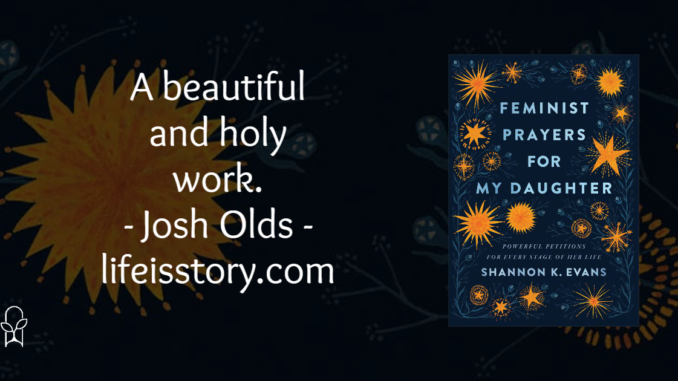
Published by Brazos Press on March 21, 2023
Genres: Non-Fiction, Christian Life, Parenting
Buy on Amazon
Goodreads

Spiritual language is often male-focused, overlooking the uniquely female experience. Author Shannon K. Evans believes our daughters deserve better.
Evans wrote Feminist Prayers for My Daughter as a gift to mothers and women everywhere. It offers short prayers that affirm the unique challenges and embrace the natural abilities embodied by our daughters, young and old alike. Categories of prayers include embodiment, relationships, wholeness, justice, equality, and milestones. This book encompasses all of life from birth to death while imagining God in ways that resonate with the feminine experience.
For mothers, grandmothers, mentors, and beyond, this prayer book provides a poignant and powerful path to both encounter God personally and seek the well-being of the daughters in our lives. It gives words to a mother's desires for her daughter in the modern world and breathes hope for a church that will give her equal power.
The summary attached to Feminist Prayers for My Daughter reads that the book is a “book of prayers for mothers.” While that emphasis on its intended audience does show through—Shannon K. Evans is a mother of five, after all—I read and prayed through these prayers as a father of a daughter and found it transformative. The summary goes on to say that the prayers cover “every age and stage of a woman’s life from birth to death, imagining God in ways that most deeply connect with the feminine experience.” We have this cultural picture of God, too often, as the White bearded man in the sky—a Zeus of Renaissance Europe made in the image of Michelangelo. Evans subverts that false cultural image and replaces it with one that’s more biblical, one that realizes how femininity and womanhood are reflections of God’s image. This is important for mothers—that they see themselves and their daughters reflected in the imago Dei—but also important for fathers, that they understand their daughters for who they are: a reflection of the strength, power, and majesty of God.
Feminist Prayers for My Daughter is very deserving of the “feminist” descriptor. Evans (and Brazos Press, her publisher) makes no apology for this and offers no defense against a certain contingent of Christian thinking that perceives “feminism” to be in contradiction to the faith. Evans simply refuses to play in the culture wars altogether, and in this offers a firm lesson to the daughters for whom she is praying that they should never have to defend their right to exist as they are. She also implicitly offers a critique against the conservative lampoon of feminism, portraying a feminism that is altogether feminine, one that rejoices in childbirth, celebrates menarche, and commemorates menopause.
Shannon K. Evans is a writer in the contemplative Catholic tradition, the author of Rewilding Motherhood, and a speaker on topics related to motherhood, prayer, and justice. That makes her the perfect person to pen these prayers. Feminist Prayers for My Daughter is divided into eight parts, each with ten prayers that can be prayed in 3-5 minutes. Not every prayer is meant for every person or every occasion, enabling them to be specific enough to deal with specific circumstances while yet being general enough to apply to a wide number of people.
The themes of the prayers include: relationships, embodiment, spirituality, womanhood, wholeness, justice, equality, and milestones. Evans’ words are holy and poetic. They are prayers but also devotions. For myself, whose daughter is still very young, many of these prayers were reminders of the challenges and joys my daughter will face as she grows up.
My lone quibble is that, in the prayer entitled “for when gender boxes are too small,” Evans continues to use female pronouns rather than move to gender-inclusive terms. It’s a small thing, and the very fact the book includes a prayer for those struggling with how culture perceives and defines femininity is absolutely amazing, but I can’t help but think that a small change to a larger pronoun “box” would help exemplify what was being said in the prayer’s title.
I grew up in a Christian tradition that was strongly suspicious of anything liturgical, believing it could give way to ritualism. Praying the prayer of another was not something often done. But as I’ve grown, I’ve realized how God works through other people. And I think of how Jesus said that when you do not know what to pray, the Holy Spirit will intercede for you. I can’t help but think that, for many, the Holy Spirit is working through Evans to give readers the words they wouldn’t otherwise have. Prayer changes us and Evans’ prayers give us words to reflect in ways we might not have on our own. Feminist Prayers for My Daughter is a beautiful and holy work.
